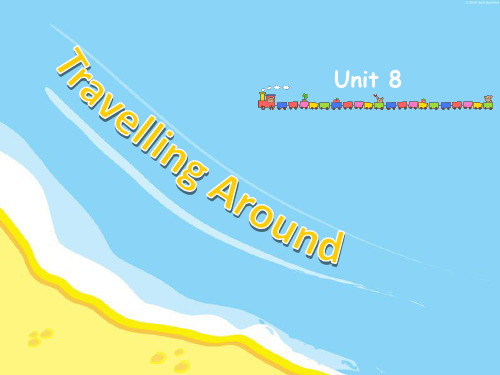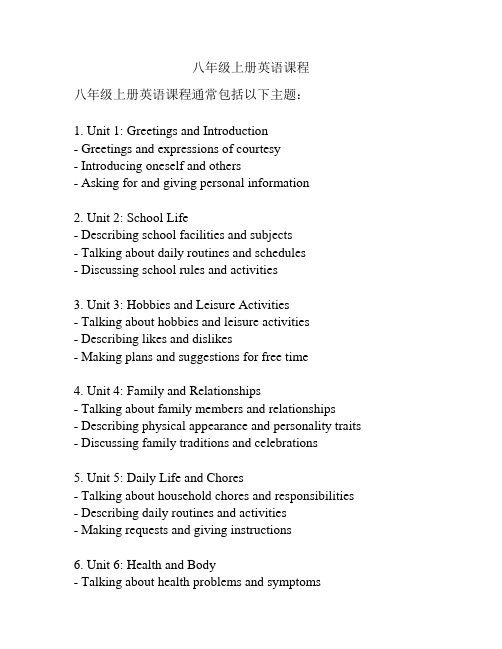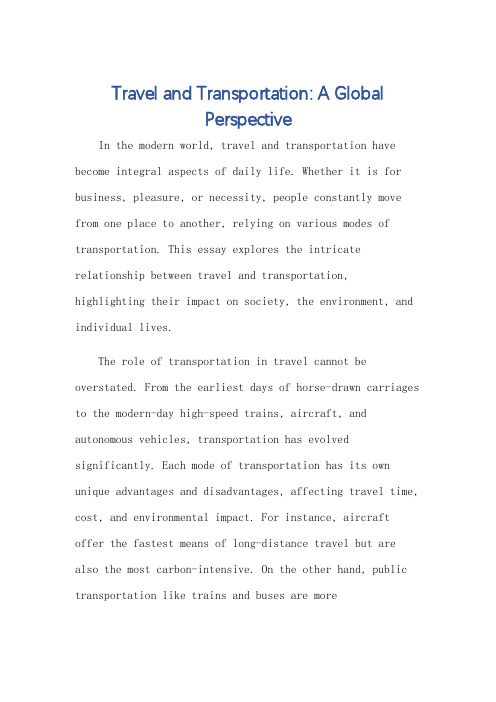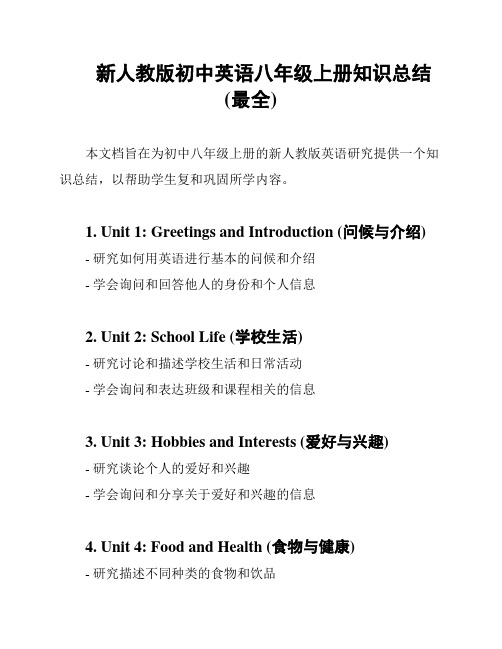unit 8 Transportation and travel
新人教版初中英语教材目录(全)

新人教版初中英语教材目录(全)1. Unit 1: Greetings and Introductions- Lesson 1: Hello!- Lesson 2: What's your name?- Lesson 3: How old are you?- Lesson 4: Where are you from?...2. Unit 2: Family and Friends- Lesson 1: My family- Lesson 2: Family members- Lesson 3: My best friend- Lesson 4: A day with friends...3. Unit 3: School Life- Lesson 1: My school- Lesson 2: My classroom- Lesson 3: Subjects- Lesson 4: School activities...4. Unit 4: Daily Routine- Lesson 1: My daily routine- Lesson 2: What time do you get up?- Lesson 3: What do you do in the morning? - Lesson 4: What time do you go to bed? ...5. Unit 5: Hobbies and Interests- Lesson 1: Free time activities- Lesson 2: Sports- Lesson 3: Music- Lesson 4: Reading...6. Unit 6: Food and Drinks- Lesson 1: Meals- Lesson 2: Fruits and vegetables- Lesson 3: Drinks- Lesson 4: Ordering food...7. Unit 7: Shopping- Lesson 1: Clothes and accessories - Lesson 2: At the supermarket- Lesson 3: Buying gifts- Lesson 4: Can I help you?...8. Unit 8: Travel and Transportation - Lesson 1: Places to visit- Lesson 2: Planning a trip- Lesson 3: Transportation- Lesson 4: At the airport...9. Unit 9: Health and Fitness- Lesson 1: Feelings and emotions- Lesson 2: Keeping fit- Lesson 3: Healthy habits- Lesson 4: Going to the doctor...10. Unit 10: Festivals and Celebrations- Lesson 1: Chinese festivals- Lesson 2: Western holidays- Lesson 3: Celebrations around the world - Lesson 4: Special occasions in my life ...... (continue with the rest of the units)。
Unit 8--Travelling Around

Warm-up
1. Watch the video and then share your opinions and experiences of travelling with your classmates.
Warm-up
2. Listen to the song. What is the main message in these lines?
5 However, if tourism is badly managed, it will destroy a place. Coasts, for example, are extremely vulnerable. Everyone wants to go there. Everyone wants to own a second home on them. And there’s just not enough coast to go around. Coasts are also important for biodiversity, because many sea creatures have their nurseries in coastline areas. So development in these areas is a highly sensitive issue. The same thing goes for attractive mountainsides like the Rockies of the West. That’s why when development occurs on a large scale it’s important that it be carefully planned.
八年级上册英语课程

八年级上册英语课程八年级上册英语课程通常包括以下主题:1. Unit 1: Greetings and Introduction- Greetings and expressions of courtesy- Introducing oneself and others- Asking for and giving personal information2. Unit 2: School Life- Describing school facilities and subjects- Talking about daily routines and schedules- Discussing school rules and activities3. Unit 3: Hobbies and Leisure Activities- Talking about hobbies and leisure activities- Describing likes and dislikes- Making plans and suggestions for free time4. Unit 4: Family and Relationships- Talking about family members and relationships- Describing physical appearance and personality traits - Discussing family traditions and celebrations5. Unit 5: Daily Life and Chores- Talking about household chores and responsibilities - Describing daily routines and activities- Making requests and giving instructions6. Unit 6: Health and Body- Talking about health problems and symptoms- Describing parts of the body and physical sensations- Giving advice and making appointments at the doctor7. Unit 7: Food and Nutrition- Talking about different types of food and drinks- Describing tastes and preferences- Discussing healthy eating habits and nutrition8. Unit 8: Travel and Transportation- Talking about travel destinations and means of transportation- Giving directions and asking for information- Describing past travel experiences and future plans9. Unit 9: Weather and Seasons- Describing weather conditions and forecasts- Talking about activities and clothing for different seasons- Discussing preferences for different types of weather10. Unit 10: Festivals and Celebrations- Describing traditional festivals and celebrations- Talking about customs and rituals- Discussing personal experiences and favorite festivals注意:具体内容可能会因学校和教材的不同而略有差异。
青少版新概念2B知识点总结

青少版新概念2B知识点总结Unit 1: Personal Information- Basic personal information, including name, age, nationality, and occupation.- The verb "to be" for describing characteristics and states.- Asking and answering questions about personal information.Unit 2: Daily Routine- Vocabulary related to daily routine activities.- Present simple tense for talking about regular activities.- Expressing likes and dislikes.- Describing frequency using adverbs of frequency.Unit 3: Weather and Seasons- Vocabulary related to weather and seasons.- Present continuous tense for talking about current weather conditions.- Describing seasons and weather changes.Unit 4: Hobbies and Interests- Vocabulary related to hobbies and interests.- Talking about favorite activities and pastimes.- Expressing preferences and opinions.- Using "would like" to express desires.Unit 5: Family and Relationships- Vocabulary related to family members.- Possessive adjectives for indicating relationships.- Talking about family members and relationships.- Describing appearance and personality.Unit 6: Daily Activities- Vocabulary related to daily activities.- Present simple tense for talking about habits and routines. - Talking about household chores and responsibilities.- Expressing ability and inability.Unit 7: Food and Eating Habits- Vocabulary related to food and eating habits.- Talking about favorite foods and meals.- Describing food preferences and tastes.- Countable and uncountable nouns for food items.Unit 8: Shopping- Vocabulary related to shopping and clothing.- Making requests and asking for help.- Talking about clothing preferences and sizes.- Describing colors and patterns.Unit 9: Travel and Holidays- Vocabulary related to travel and holidays.- Talking about travel experiences and destinations. - Making plans and discussing itineraries.- Asking for and giving directions.Unit 10: Health and Fitness- Vocabulary related to health and fitness.- Giving advice and expressing concerns.- Describing healthy and unhealthy habits.- Talking about electronic gadgets and their functions.- Expressing opinions about technology.Unit 12: School and Education- Vocabulary related to school and education.- Talking about school subjects and activities.- Describing school facilities and routines.- Expressing likes and dislikes about school.Unit 13: Jobs and Professions- Vocabulary related to jobs and professions.- Talking about different professions and work environments. - Describing job responsibilities and skills.- Discussing career aspirations.Unit 14: Sports and Activities- Vocabulary related to sports and activities.- Talking about favorite sports and physical activities.- Expressing abilities and talents in sports.- Describing sports equipment and rules.Unit 15: Places and Buildings- Vocabulary related to places and buildings.- Talking about different types of places and their functions. - Describing buildings and their appearances.- Giving directions to specific locations.Unit 16: Entertainment and Leisure- Vocabulary related to entertainment and leisure activities. - Talking about leisure time activities and hobbies.- Discussing different forms of entertainment.- Expressing preferences for different types of entertainment.Unit 17: Transportation and Travel- Vocabulary related to transportation and travel.- Talking about different modes of transportation.- Describing travel experiences and preferences.- Asking and giving information about travel arrangements.Unit 18: Describing People and Places- Adjectives for describing people's appearance and personality.- Describing places and locations.- Discussing personal experiences and observations.Unit 19: Daily Life and Culture- Vocabulary related to daily life and cultural customs.- Talking about cultural traditions and customs.- Describing daily life routines and activities.- Expressing opinions about cultural differences.Unit 20: Review- Review of key vocabulary and grammar points from previous units.- Consolidating knowledge and reviewing important concepts.以上是《青少版新概念2B》课程的知识点总结。
关于旅游与交通的英语作文

Travel and Transportation: A GlobalPerspectiveIn the modern world, travel and transportation have become integral aspects of daily life. Whether it is for business, pleasure, or necessity, people constantly move from one place to another, relying on various modes of transportation. This essay explores the intricate relationship between travel and transportation,highlighting their impact on society, the environment, and individual lives.The role of transportation in travel cannot be overstated. From the earliest days of horse-drawn carriages to the modern-day high-speed trains, aircraft, and autonomous vehicles, transportation has evolved significantly. Each mode of transportation has its own unique advantages and disadvantages, affecting travel time, cost, and environmental impact. For instance, aircraftoffer the fastest means of long-distance travel but are also the most carbon-intensive. On the other hand, public transportation like trains and buses are moreenvironmentally friendly but may not offer the same level of convenience or speed.The impact of travel and transportation on society is profound. Tourism, a direct outcome of travel, generates significant economic activity, creating jobs and revenuefor local communities. It also promotes cultural exchange and understanding between different parts of the world. However, this growth is not without its challenges. Over-tourism, for instance, can strain local infrastructure, leading to issues like traffic congestion, pollution, and overcrowding.The environmental impact of travel and transportation is also a critical concern. The emissions from fossil fuel-powered vehicles contribute significantly to climate change and air pollution. As the global community increasingly recognizes the urgency of addressing these issues, there is a growing focus on sustainable transportation solutions. Electric vehicles, renewable energy sources, and smart transportation systems are among the innovative technologies that aim to reduce the environmental footprint of travel.Individual lives are also deeply affected by travel and transportation. For many, travel is a source of relaxation and fun, allowing them to escape the routine of daily life and explore new places and cultures. However, the stressand inconvenience of commuting can also take a toll on individuals, affecting their well-being and productivity. This underscores the importance of designing transportation systems that are not only efficient but also user-friendly and comfortable.In conclusion, travel and transportation areinextricably linked to our lives, shaping our society, environment, and individual experiences. As we move forward, it is crucial to consider the impact of our travel choices and seek sustainable solutions that balance the needs of society, the environment, and individuals. By doing so, we can ensure that travel and transportation continue toenrich our lives while minimizing their negative impacts on our planet.**旅游与交通:全球视角**在现代社会,旅游与交通已经成为日常生活中不可或缺的部分。
新人教版初中英语八年级上册知识总结(最全)

新人教版初中英语八年级上册知识总结(最全)本文档旨在为初中八年级上册的新人教版英语研究提供一个知识总结,以帮助学生复和巩固所学内容。
1. Unit 1: Greetings and Introduction (问候与介绍)- 研究如何用英语进行基本的问候和介绍- 学会询问和回答他人的身份和个人信息2. Unit 2: School Life (学校生活)- 研究讨论和描述学校生活和日常活动- 学会询问和表达班级和课程相关的信息3. Unit 3: Hobbies and Interests (爱好与兴趣)- 研究谈论个人的爱好和兴趣- 学会询问和分享关于爱好和兴趣的信息4. Unit 4: Food and Health (食物与健康)- 研究描述不同种类的食物和饮品- 学会提醒他人注意饮食健康和生活惯5. Unit 5: Festivals and Celebrations (节日与庆祝) - 研究讨论和描述各种节日和庆祝活动- 学会询问和分享关于节日和庆祝的信息6. Unit 6: Travel and Transportation (旅行与交通) - 研究谈论旅行和交通方式- 学会询问和表达关于旅行和交通的信息7. Unit 7: Daily Routines (日常作息)- 研究讨论和描述日常作息和活动安排- 学会询问和分享关于日常作息的信息8. Unit 8: Environmental Protection (环境保护)- 研究讨论和描述环境保护的重要性和方法- 学会提醒他人关于环境保护的意识和行动本文档总结了新人教版初中英语八年级上册所有单元的核心内容。
希望这个总结能帮助同学们回顾和巩固所学的知识,以便更好地应对考试和实际应用。
仁爱版八年级上册英语知识点总结详细版
仁爱版八年级上册英语知识点总结详细版本文档总结了仁爱版八年级上册英语的知识点,以供参考。
Unit 1: Greetings and Introductions- Greetings: Hello, Hi, Good morning, Good afternoon, Good evening- Introduction: My name is..., I am from..., Nice to meet you, How are you?Unit 2: School Life- Subjects: English, Math, Science, History- Classroom objects: desk, chair, board, book, pen- School activities: study, read, write, listen, speakUnit 3: Family- Family members: father, mother, brother, sister- Relationships: parents, grandparents, siblings- Describing family members: tall, short, young, oldUnit 4: Hobbies and Interests- Hobbies: playing sports, listening to music, reading books- Leisure activities: watching movies, playing games, hanging out with friendsUnit 5: Food and Drinks- Food items: rice, noodles, chicken, beef, vegetables- Drinks: water, milk, tea, juiceUnit 6: Daily Routine- Daily activities: wake up, brush teeth, have breakfast, go to school - Time expressions: in the morning, in the afternoon, in the eveningUnit 7: Travel and Transportation- Modes of transportation: car, bus, train, bicycle- Travel destinations: city, beach, countrysideUnit 8: Holidays and Celebrations- Festivals: Christmas, Easter, New Year- Celebrations: birthday, wedding, graduation以上是仁爱版八年级上册英语的知识点总结,希望对你有所帮助!。
新概念第一册每一单元重点总结
新概念第一册每一单元重点总结Unit 1 - 10- Unit 1: Self-introduction and personal information.- Unit 2: Talking about daily activities and routines.- Unit 3: Expressing likes and dislikes.- Unit 4: Discussing occupations and work.- Unit 5: Describing places and directions.- Unit 6: Talking about past events and experiences.- Unit 7: Discussing hobbies and free time activities.- Unit 8: Expressing opinions and preferences.- Unit 9: Discussing future plans and aspirations.- Unit 10: Talking about weather and seasons.Unit 11 - 20- Unit 11: Talking about travel and transportation.- Unit 12: Describing objects and their functions.- Unit 13: Talking about daily routines and habits.- Unit 14: Discussing health and well-being.- Unit 15: Describing the natural environment.- Unit 17: Discussing cultural topics and traditions.- Unit 18: Talking about personal experiences and memories. - Unit 19: Discussing food and cooking.- Unit 20: Talking about shopping and consumerism.Unit 21 - 30- Unit 21: Describing people's physical appearance.- Unit 22: Talking about events and celebrations.- Unit 23: Discussing entertainment and leisure activities.- Unit 24: Talking about education and learning.- Unit 25: Describing animals and pets.- Unit 26: Discussing household chores and responsibilities. - Unit 27: Talking about relationships and social connections. - Unit 28: Describing cities and urban life.- Unit 29: Discussing holidays and vacations.- Unit 30: Talking about personal achievements and goals.Unit 31 - 40- Unit 31: Describing clothing and fashion.- Unit 33: Discussing sports and physical activities.- Unit 34: Talking about health and fitness.- Unit 35: Describing the natural world and environment.- Unit 36: Discussing professions and career choices.- Unit 37: Talking about transportation and travel.- Unit 38: Describing everyday routines and habits.- Unit 39: Discussing literature and books.- Unit 40: Talking about historical events and figures.Unit 41 - 50- Unit 41: Describing the human body and health.- Unit 42: Talking about entertainment and leisure activities. - Unit 43: Discussing technology and its impact on society. - Unit 44: Talking about relationships and social connections. - Unit 45: Describing food, cooking, and recipes.- Unit 46: Discussing cities and urban life.- Unit 47: Talking about holidays and vacations.- Unit 48: Describing personal experiences and memories. - Unit 49: Discussing education and learning.- Unit 50: Talking about achievements and goals.Unit 51 - 60- Unit 51: Describing clothing, fashion, and personal style. - Unit 53: Discussing sports and physical activities.- Unit 54: Talking about health and fitness.- Unit 55: Describing the natural world and environment. - Unit 56: Discussing professions and career choices.- Unit 57: Talking about transportation and travel.- Unit 58: Describing everyday routines and habits.- Unit 59: Discussing literature and books.- Unit 60: Talking about historical events and figures. Unit 61 - 70- Unit 61: Describing the human body, health, and medical conditions.- Unit 62: Talking about entertainment and leisure activities.- Unit 63: Discussing technology and its impact on society.- Unit 64: Talking about relationships and social connections.- Unit 65: Describing food, cooking, and recipes.- Unit 66: Discussing cities and urban life.- Unit 67: Talking about holidays and vacations.- Unit 68: Describing personal experiences and memories.- Unit 69: Discussing education and learning.- Unit 70: Talking about achievements and goals.Unit 71 - 80- Unit 71: Describing clothing, fashion, and personal style.- Unit 73: Discussing sports and physical activities.- Unit 74: Talking about health and fitness.- Unit 75: Describing the natural world and environment.- Unit 76: Discussing professions and career choices.- Unit 77: Talking about transportation and travel.- Unit 78: Describing everyday routines and habits. - Unit 79: Discussing literature and books.- Unit 80: Talking about historical events and figures.。
六年级上册剑桥英语知识点
六年级上册剑桥英语知识点六年级上册剑桥英语是小学英语教材中的一部分,该教材旨在提高学生的英语口语和听力能力,并逐渐扩展他们的词汇量和语法知识。
下面,我将为您详细介绍六年级上册剑桥英语的知识点。
Unit 1 - Greetings and Introductions1. Basic greetings: Hello, Good morning, Good afternoon, Good evening.2. How to introduce yourself: My name is... I am from...3. How to ask and answer questions about personal information: What's your name? How old are you? Where are you from?Unit 2 - Family and Friends1. Vocabulary related to family members: father, mother, brother, sister, grandparents.2. How to describe family relationships: He is my father. She is my sister.3. Talking about friends: Who is your best friend? What is he/she like?Unit 3 - Food and Drinks1. Vocabulary related to food and drinks: apple, banana, hamburger, juice, milk.2. How to ask and answer questions about food preferences: Do you like apples? What is your favorite drink?Unit 4 - Daily Activities1. Vocabulary related to daily activities: wake up, get dressed, eat breakfast, go to school.2. How to ask and answer questions about daily routines: What time do you wake up? What do you do after school?Unit 5 - School Life1. Vocabulary related to school subjects: English, math, science, history.2. Talking about school activities: What is your favorite subject? Do you like school? Why?Unit 6 - Hobbies and Sports1. Vocabulary related to hobbies: read, draw, dance, sing.2. How to talk about hobbies and sports: What do you like doing in your free time? Do you play any sports?Unit 7 - Holidays and Celebrations1. Vocabulary related to holidays: Christmas, birthday, New Year's Day.2. How to talk about holiday traditions: What do you do on Christmas? How do you celebrate your birthday?Unit 8 - Travel and Transportation1. Vocabulary related to transportation: car, train, bus, plane.2. Talking about travel experiences: Have you ever traveled by plane? Where did you go?Unit 9 - Weather1. Vocabulary related to weather: sunny, rainy, windy, snowy.2. How to describe the weather: What's the weather like today? It's sunny and warm.Unit 10 - Animals1. Vocabulary related to animals: cat, dog, elephant, giraffe.2. How to describe animals: What animals do you like? What is your favorite animal?这些是六年级上册剑桥英语的知识点,通过学习这些知识点,学生可以提升他们的英语水平,加强他们的听力和口语能力。
职高英语基础模块
职高英语基础模块Unit 1: Personal InformationIn this unit, students will learn how to introduce themselves and provide basic personal information. They will practice introducing their names, ages, nationalities, and occupations. They will also learn how to ask and answer questions about personal information.Unit 2: Daily ActivitiesThis unit focuses on the daily routines and activities of individuals. Students will learn how to talk about theirdaily schedules, including waking up, eating breakfast, going to school or work, and participating in leisure activities. They will also learn how to discuss the days of the week and daily time expressions.Unit 3: Family and FriendsIn this unit, students will learn vocabulary related to family members and friendships. They will practice talking about their family members, including parents, siblings, and extended family. They will also learn how to describe friends and discuss common activities done with friends.Unit 4: Food and HealthThis unit covers vocabulary and expressions related tofood and health. Students will learn how to discuss food preferences, cooking habits, and eating habits. They willalso learn how to talk about health issues and visit a doctor.Unit 5: School and WorkIn this unit, students will learn how to talk about their school and work environments. They will learn vocabulary related to school subjects, classrooms, and school facilities. They will also learn how to discuss their jobs, work responsibilities, and professional skills.Unit 6: Hobbies and InterestsThis unit focuses on leisure activities and hobbies. Students will learn how to talk about their interests and hobbies, including sports, music, art, and other recreational activities. They will also learn how to discuss pastimes and leisure time.Unit 7: Travel and TransportationIn this unit, students will learn vocabulary and expressions related to travel and transportation. They will practice discussing travel plans, modes of transportation, and travel experiences. They will also learn how to ask for and give directions.Unit 8: Shopping and ServicesThis unit covers vocabulary and expressions related to shopping and services. Students will learn how to discuss shopping habits, money, and making purchases. They will alsolearn how to talk about various services, such as banking, postal services, and personal care services.Unit 9: Technology and MediaIn this unit, students will learn about technology and media vocabulary and expressions. They will learn how to discuss electronic devices, social media, and online activities. They will also learn how to express opinions and share information about media sources, such as television, newspapers, and the internet.Unit 10: Celebrations and FestivalsThis unit focuses on vocabulary and expressions related to celebrations and festivals. Students will learn how to talk about different cultural and traditional celebrations, including holidays, festivals, and special events. They will also learn how to discuss customs and traditions associated with these celebrations.Overall, the Basic Module of Vocational High School English provides students with essential language skills and knowledge to communicate effectively in various personal, social, and professional situations. The unit-based approach helps students build a strong foundation in English language learning and prepares them for further studies and career development.。
- 1、下载文档前请自行甄别文档内容的完整性,平台不提供额外的编辑、内容补充、找答案等附加服务。
- 2、"仅部分预览"的文档,不可在线预览部分如存在完整性等问题,可反馈申请退款(可完整预览的文档不适用该条件!)。
- 3、如文档侵犯您的权益,请联系客服反馈,我们会尽快为您处理(人工客服工作时间:9:00-18:30)。
Reference
Ⅰ .Shorten the travel time, resulting in enormous social benefits. Ⅱ. Improving China's international status. Ⅲ. Playing an important role in promoting the economic development and land development along the city ; Ⅳ. Increasing the number of firms along. A corresponding increase in national and local tax. Ⅴ. Saving energy and reducing environmental pollution. Ⅵ. Resulted in greater competition on Civil Aviation.
B. Group work What traffic and transportation problems are common where you live? traffic jam full parking lots slow public transportation …… What solutions could solve transportation problems?
Unit 8 Transportation and travel
Warm--up
The development of transportation
Animal Riding
wheel
Gharry
Bicycle
Motorbike
Car
Some kinds of the car
Future transportation
Reference words
Air transport
fast… short time… food… more convenient and efficient… sights in the air… quality service… Long line for security checks
Rail transport
Warm-up questions
1.How has transportation changed
since your grandparents were young?
2.What types of transportation
would you like to see in the future?
C. Role-play What is the worst transportation experience you’ve ever had? Make a dialogue with your partner.
Activity 2 Group discussion
Compare air and rail (road) transportation and discuss the advantages and disadvantages of each.
Homework
Imagine you have 3-5 days holiday, where are you going to travel? What types of transportation will you use? Make a travel plan.
Brainstorming
Look at the pictures and try to brainstorm the words and expressions related to transport.
交通工具(transport)
bike/ bicycle 自行车 motorcycle 摩托车 car 小汽 车 bus 公共汽车 jeep 吉普车 truck 卡 车 ambulance 救护车 carriage 四轮马车 van 厢式 货 车 taxi 出租车 tractor 拖拉机 lorry 重型卡车 coach 大客车 warship军舰 subway 地铁 railway 铁路 train 火车 express 快客列车 boat 小船 ship 船 yacht 游 艇 vessel 大船 aeroplane 飞机 plane 飞机 aircraft 飞 机 airplane 飞机 jet喷气飞机 helicopter 直升飞机
8A Getting around town
Activity 1
A. Work alone What types of transportation do you often use? by airplane by bus by boat on foot by bike by car by train
B. Listening. Complete the chart.
Alice 1.How did they travel? Rick Nancy
2.Why did they travel this way? 3.How long did it take? 4.What did they enjoy the most?
8B Going places
Activity 1 look at these pictures.
A. Pair work Discuss these questions.
Have you traveled on a ferry, a high-speed train, or a plane? What was it like? What types of transportation would you like to try? Why? Do you prefer to go to places quickly or take your time? Why? Do you prefer to go to places cheaply or in comfort? Why?
B. Pair work Look at these pictures. Discuss these transportation problems with your partner.
Activity 2
A. Listening You will hear five people talk about transportation problems. Check the problems. You will hear the people suggest solution. Complete the chart.
1.Creating metro bus systems broadening major roads 2.Creating a system of customized bus routes highlighting the development of subways, trolleys and light rail 3.Dynamic management of parking 4. Stagger to and from work
at a slower speed… large quantities of freight… enjoy beautiiscussing
Watch a video clip about China's high-speed rail. What do you think of the development of high-speed rail in China?
